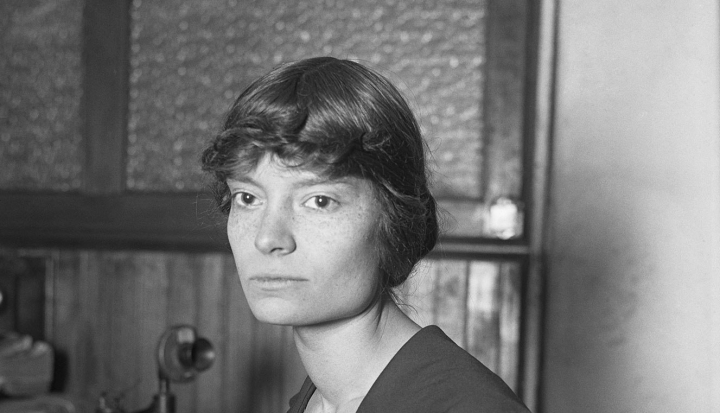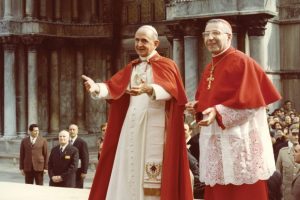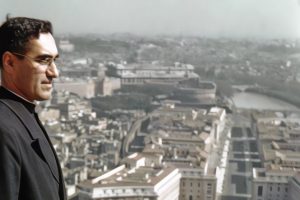Suppose someone decided to take the Gospels of Christ literally: to feed the hungry, clothe the naked, harbor the harborless. What would he or she be like? The answer might be brief: like Dorothy Day, who for over four decades has kept open house for the poor in New York City, offering food, shelter, and clothing to all.
The 77-year-old co-founder of the Catholic Worker Movement, whose credo prescribes “immediate response to the need of the other person,” looks like anyone’s grandmother, but her impact is that of a delayed-action bomb.
“She says these dynamite things as if she were talking about going to the store,” reported a student at Bridgewater State College in Massachusetts after she had lectured there.
“People say our work with the poor is utterly useless, like putting a band-aid on a cancer,” she said placidly. “They say society must be changed. But what about the people in need now? They can’t wait, Scripture says we should do what comes to hand.
“We like direct action—give the man in need your coat or cloak. Scripture goes further than any welfare worker. But we can’t ask anyone else to help unless we first do all we can ourselves.”
Painfully arthritic, she gave her Bridgewater lecture sitting down, and the effect of her low-key address was as if she were chatting in someone’s living room. She wore a long-skirted blue suit which, like all her clothes, had come from the Catholic Worker supply of donated garments. She had lately trimmed her long white hair and didn’t like the way the ends of her shortened braids “stuck out,” so she covered them with a small kerchief. Her shoes were low, black, and well-worn.
Having Dorothy Day as a houseguest is, we discovered, rather like having St. Francis of Assisi drop in. When she stayed with our family in Fall River in the course of her Massachusetts lecture tour, our six children, ages seven to 15, didn’t know what to expect. They had heard of her all their lives, but couldn’t imagine meeting this legendary being face to face.
“She’s just like Grandma,” was the verdict of our ten-year-old.
It was also the reaction of a young Episcopal clergyman who visited us during her stay. “I walked into the living room,” he said, “and there was this grandmotherly old lady. Next thing I knew, I was being introduced to Dorothy Day.” Normally articulate, he was speechless.
Dorothy Day (no one calls her Miss Day) has that sort of presence. At Bridgewater she spoke to an audience of townspeople, faculty, and students. The word most often heard afterwards was holiness.
She told her hearers that as a young girl she had worked on The New York Call, a socialist newspaper, and had been so horrified by the conditions under which she saw the poor living that she decided the only way to get over her aversion was to share their misery.
Her father, also a journalist, was a conservative who insisted that his daughters “never saunter in public, but walk briskly and always appear in hats, gloves, and well-heeled shoes.” But when 19-year-old Dorothy left home to share the lot of the poor, he approved. “He was glad to see me go because he thought I was a bad example to my younger sister.”
Life in an unheated, poorly lit New York tenement was Dorothy Day’s introduction to the class struggle. “To bathe, I had to walk half a mile to a municipal shower. Some people in New York still have to do that.”
During this period she was jailed after participating in a demonstration for women’s suffrage. And she joined some Columbia University students in protesting U.S. involvement in World War I. Through the years she has been no stranger to imprisonment in behalf of causes ranging from civil disobedience during World War II air raid drills to demonstrating last year in the United Farm Workers’ struggle, at which time she spent two weeks in a California jail.
“My whole life has been one war after another,” she said. “In my long lifetime I’ve never seen conditions worse. Things are harder now than they ever were in the Depression. There’s no living space. The Depression seemed heaven compared to now.” But on the same January night on which Dorothy Day spoke, the president was delivering a State of the Union message, declaring that Americans are now enjoying the highest standard of living ever known.
Dorothy Day told her Bridgewater audience that she was attracted to Communism while she was on The Call, but that her friends maintained she “was too religious to make a good Communist.” They were proved right in 1927 when she became a Catholic. She was 30 years old, and part of the price of conversion was separation from her common-law husband, by whom she had one daughter.
She continued writing for socialist publications, and her work brought her to the attention of Peter Maurin, a French peasant and former Christian Brother who had come to the United States with a philosophy of a “green revolution.” His plan included development of Christian farming communes, round table discussions of workers and scholars, and the establishment of city houses of hospitality operated with the directness and simplicity of the Gospels. On May Day, 1933, Peter Maurin and Dorothy Day published the first issue of The Catholic Worker, a tabloid promulgating these ideas.
Thereafter, until Maurin’s death in 1949, the two crisscrossed the country, lecturing and aiding in the establishment of green revolution houses and farms. Dorothy Day’s daughter, Tamar, was always a part of the activity, being brought up partly in boarding schools and partly in the succession of tenement buildings which over the years housed the expanding Catholic Worker organization. Now the mother of nine and grandmother of eight children, Tamar lives in Vermont.
After Maurin’s death Dorothy Day continued his program, aided by a procession of young idealists, including either as brief visitors or long-term staff workers virtually every notable lay Catholic of the past four decades.
Ironically, not long ago, she was fined $250 as a slumlord, the Catholic Worker building having been found in violation of a provision of the New York City building code.
“A rumpled man I thought was from our breadline shambled up to me and put something in my hand. ‘For the fine,’ he mumbled. I didn’t look at what he’d given me until a little later and then I saw it was a check from the late W.H. Auden. I hadn’t recognized him.”
Philosophically, the Catholic Worker organization is opposed to war and totalitarianism. “We were about the only Catholic group opposed to the Spanish civil war.” But not all staff members agreed with complete pacifism. In World War II a “great split” occurred as many young men joined the armed forces.
But neither did the Catholic Worker completely subscribe to the actions of the Berrigan brothers. “We did not support their destruction of property because you don’t do to others what you wouldn’t want them to do to you. We believe in non-violence, following the teachings of Gandhi.”
A Gandhian technique used by the Worker, said Dorothy Day, is that of openness. “If we’re going to march, picket, fast, or whatever, we tell the authorities about it. The peace movement doesn’t resist evil. It’s the whole business of accepting the cross. In houses of hospitality you have many opportunities to do that. There’s violence all about—but we’ve never had anyone hurt. Windows get broken, not heads. At tense moments we stand there and pray.”
In a couple throw-away lines at the end of her Bridgewater talk Dorothy Day summed up her life and philosophy. “Don’t say no to things,” she advised. “And be what you want the other fellow to be.”
During her stay with us Dorothy Day shopped at a low-cost department store, seeming thoroughly to enjoy selecting an inexpensive woolen hat. She wanted to see the ocean, so we drove to a nearby rock shore, where she insisted that we park well back from its edge. Unafraid of human hostility, she is terrified of “dogs and cliffs.”
En route, she spoke of women: “Women’s liberation is very necessary because women have always been minimized and underpaid; but a great deal of it is too self-centered. It’s not geared to the poor, but to articulate middle-class women with time on their hands, the ones who have the least to complain about. Among the poor the position of women is dreadful.
“And I think women need the companionship of women. This is often at the root of lesbianism. Women are so lonely.”
As for women priests: “It’s a vocation that doesn’t attract me but I wouldn’t disapprove of it. If there are women premiers and prime ministers, why not a woman pope?”
On population control: “I would be afraid to say when I wanted children for fear I wouldn’t have them when I was ready. Birth control and abortion are forms of genocide.”
On the U.S. South: “It is now the most peaceful part of the country. The seed fell into the ground and died in the South and it was fertilized by young people giving their lives. Now there is an atmosphere of peace and loving kindness in Mississippi you don’t find up North. Our breadline is three-quarters black, and I feel like telling them to go back to Mississippi.”
Whenever possible, Dorothy Day attends daily Mass, and on a Wednesday she went to St. Mary’s Cathedral in Fall River, where she melted into the crowd of elderly ladies forming most of the congregation. She responded enthusiastically when a woman in the pew ahead of her shook her hand and wished her a pleasant day at the “kiss of peace” ceremony. The officiating priest kept looking at her as if he couldn’t quite place her, doubtless half-remembering a score of magazine and newspaper pictures.
During her stay there was much good talk with Dorothy Day. She is no one-track reformer, but a sophisticated theater and concert-goer, especially at home with modern American fiction, Russian literature, and the novels of 19th-century England. Herself a writer of grace and distinction, she has written several books—for the most part autobiographical—and she contributes a monthly column, “On Pilgrimage,” to The Catholic Worker.
The Catholic Worker, usually eight pages, has a circulation of 85,000. The work of mailing it is done by a pick-up crew from the First Street house.
“For office equipment we have a stencil machine held together with hairpins, and three typewriters,” said Dorothy day. “Everyone helps put out the paper, men from the breadline, staff members, visitors.”
She has frequently appeared on television, and she recalled a recent occasion in Boston. “It took us hours to tape the show. The technicians and cameramen kept putting down their equipment and getting into discussions on abortion, birth control, war and peace.”
Dorothy Day’s “begging letters” on behalf of the poor whom the Catholic Worker serves are sent semi-annually to thousands. Always fresh and conscience-stirring, they are reminiscent of the letters to the New York Times written by Rose Hawthorne Lathrop, daughter of Nathaniel Hawthorne, whenever her religious community, the Servants of Relief for Incurable Cancer, was in need of funds.
Personally, Dorothy Day lives poverty. When she left Fall River, she took a Greyhound bus to New York, carrying with her a paper-bag lunch. She insisted on including in it a three-day-old peanut butter sandwich. “It’s still edible,” she said.
She has not read her recently published biography, A Harsh and Dreadful Love by William D. Miller. “People have told me I might not like it.”
The title, however, is part of what is probably her favorite quotation, from The Brothers Karamazov: “Love in action is a harsh and dreadful thing compared with love in dreams. Love in dreams is greedy for immediate action, rapidly performed in sight of all. . . . But active love is labor and fortitude.”
Through the years the federal government has paid frequent attention to Catholic Worker activities—often when agents came searching for young draft resisters and pacifists, or when treasury official sought payment of back taxes. Insisting on the personal nature of works of charity, the worker has never incorporated as a non-profit organization; therefore gifts to it are not tax deductible.
But recently, said Dorothy Day, the Internal Revenue Service at last conceded that she and her coworkers were not “making profits out of the poor,” and various tax claims were dropped.
Possibly Internal Revenue decided it was next to impossible to collect taxes from one whose philosophy is “We aim to give away everything we have. You always get back what you need.”
Also confusing might be the observation that donations to the catholic Worker are apparently obedient to the law stated in Pie-Raymond Regamey’s book, Poverty: “All these things that we cannot get hold of as long as we seek them so avidly come freely as we need them for the service of God and our fellows. . . . It is a fact that God sends us what we need—whether money, interior strength, or good fortune. . . . The law is so certain that the more daring saints have even founded institutions on it.”
Catholic Worker institutions, thus founded, include a colony of Staten Island summer cottages where the weary and sick can flee from the torrid city; a Harlem apartment house set on its feet by the Worker and now cooperatively owned by its tenants; and always a farm—the current one a large former estate in Tivoli, New York, where “knights of the road” are sheltered and where there are also facilities for summer workshops and other programs.
In addition there have always been varying numbers of houses of hospitality throughout the country, autonomous, but taking their inspiration from Dorothy Day and keeping in touch with each other through the pages of The Catholic Worker.
The New York house itself will soon move into larger quarters where “we will be able to take care of a great many more needy and helpless old women than before.”
To the organizational ability needed to manage undertakings of this scope Dorothy Day joins “a supreme disinterestedness which seeks God Himself, not his gifts,” to quote Regamey once more. Asked what will happen to the Catholic Worker movement upon her death or inability to continue its operation, she shrugged casually, “It doesn’t matter.”
This article also appears in the October 1975 issue of U.S. Catholic (Vol. 40, No. 10, pages 28–31). Click here to subscribe to the magazine.
Image: Wikimedia Commons cc













Add comment